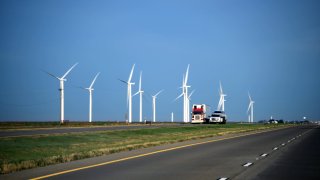
- In the very short term, higher energy prices can lead to a rush to produce more oil.
- Longer term, higher and more volatile energy prices will be a catalyst for individual and global efforts to decarbonize the energy grids, which is critical for meeting climate change goals.
- But energy prices won't be enough to drive the kind of decarbonization needed to meet climate goals.
After Russia invaded Ukraine, energy prices spiked. U.S. crude oil prices reached as high as $130 on March 6, the highest since July 2008. About a week later, U.S. gasoline prices hit a record high price of $4.33 per gallon. Around the same time, natural gas futures in the European Union hit a record high of €345 per megawatt-hour.
In the time since, gas prices and natural gas have come off their highs and gas prices should come down eventually, though slower than President Joe Biden would like.
Higher and more volatile energy prices will be a catalyst for individual and global efforts to decarbonize energy grids, which is critical for meeting climate change goals. But energy prices alone aren't going to be a tipping point that gets society to embrace cleaner energy sources, experts say. Government intervention and widespread education are also critical.
Get Tri-state area news and weather forecasts to your inbox. Sign up for NBC New York newsletters.
Oil producers will drill more
If oil prices remain elevated, that could lead to a rush to drill more oil, as hydrocarbon companies look to cash in on the higher price, according to John Larsen, a partner at the Rhodium Group where he leads the firm's US energy system and climate policy research.
Money Report
In turn, that could flood the supply and eventually bring prices back down.
That's exactly what Secretary of Energy Jennifer Granholm called for when oil was $109 a barrel and gas cost $4.25 at the pump.
"We are on a war footing — an emergency — and we have to responsibly increase short-term supply where we can right now to stabilize the market and to minimize harm to American families," Granholm said, speaking to an industry of energy executives in Houston earlier in March. She went on to call on executives to produce more oil and gas.
Ramping up fossil fuel production runs counter to urgent calls to decarbonize to slow global warming. But it's temporary and therefore reasonable, according to Larsen. "I personally don't think that's going to jeopardize meeting long-term climate targets, so long as there is double-down serious commitment to getting from here to that transition," he told CNBC.
Also, the oil and gas industries are facing the same tight labor market that the rest of the nation is, and so they may face challenges to ramping up oil well digging and production as fast as they'd like.
"Just like almost everything else in the U.S., labor is really scarce. It's hard to hire people, it's hard to get equipment. Supply chains are really strained," Ryan Kellogg, a faculty affiliate at the Energy Policy Institute at the University of Chicago (EPIC) and a professor at the Harris School of Public Policy, told CNBC. The overall unemployment fell to 3.8% in February, according to the Labor Department.
Consumers will look for more efficiency
High gas prices at the pump will motivate consumers to switch from a conventional car to other kinds of transportation, whether that's a fuel-efficient car or an electric vehicle, Kellogg told CNBC.
"These higher prices — even if they're short lived, just being exposed to this higher price volatility — is going to make consumers think about alternatives," Kellogg said.
Consumers may have a hard time finding an electric vehicle even if they want to. Inventories of new cars and trucks including electric vehicles are running very low, due to supply chain woes, among other issues.
Frank Dalene, the president and CEO of Telemark, a luxury construction services business he co-founded with his brother Roy in 1978, specializes in energy efficiency and renewable energy home construction on Long Island in New York. Increases in energy prices drive interest in his services, but educating consumers about the money they can save by increasing inefficiency is more important.
"Education is, I believe, the biggest thing," Dalene told CNBC. "We cost-justify everything," Dalene said, meaning they clearly explain how many years it will take before the customer makes their money back. "And that's been very successful."
Investors will take a new look at renewables
"All else equal in the medium term, higher prices are good for clean energy," Larsen told CNBC.
In addition to their decarbonization benefits, investments in clean energy are also becoming attractive as a way to protect the American economy from the swings energy prices due to geopolitical changes.
"Drill drill drill" is going to help with prices now, in the next year," Kellogg said. "It's not going to help us whenever the next crisis comes in 10 years, or whenever it happens." But decarbonization will help protect against geopolitical oil shocks.
While the conditions make new energy infrastructure more attractive, changing existing technology faces resistance, just for the sake it is new and requires change. Higher energy prices serve to reduce the anxiety and risk from an investment, says Steve Crolius, president of Carbon Neutral Consulting and a former climate advisor at the Clinton Foundation. Crolius advises entrepreneurs and project developers interested in investing in alternative fuel sources.
"If any of them feel anxious, they probably feel less anxious," Crolius said. "The mountain to climb becomes a lot smaller."
Government is necessary
Even while more volatile and higher energy prices will generally be a catalyst for renewable energy investments for consumers and larger investors, the price differential won't be enough to completely move to a clean-energy economy.
"The only thing that really ramps up technology deployment to the scale that you really need is something like serious regulations from the EPA on vehicles and power plants coupled with the tax credits, like the ones in Build Back Better," Larsen said, referencing the Biden policy agenda, which included more aggressive climate provisions. That bill has languished in Congress after being opposed by Sen. Joe Manchin, D.-W.Va.
Even as renewable installation has been accelerating, Rhodium's projections show investments need to be twice as large as 2021's record level, every year between now and 2030, to reduce CO2 emissions from electricity generation by 80% — a milestone on the White House's proposed path to get to 100% clean energy by 2035.
"I don't see how just a change in fossil fuel prices catalyzes that," Larsen said.






